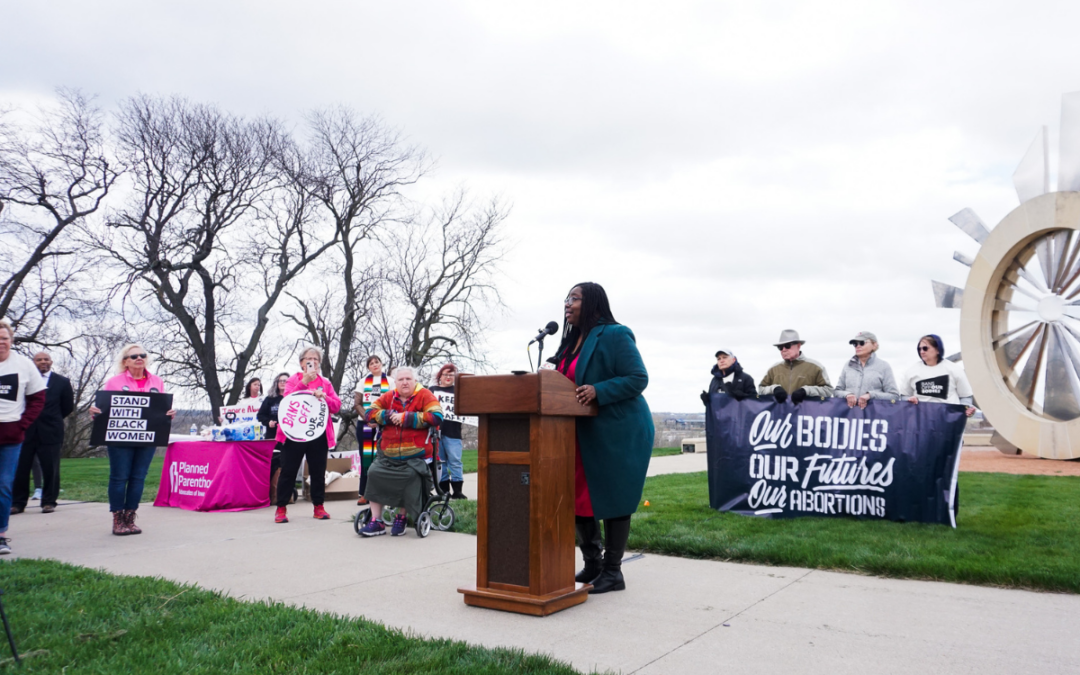
FILE - A container with frozen embryos and sperm stored in liquid nitrogen is removed at a fertility clinic in Fort Myers, Fla., Oct. 2, 2018. (AP Photo/Lynne Sladky, File)
Enshrining the idea of life beginning at fertilization, before implantation, would threaten Iowan’s abilities to access certain kinds of contraceptives and to in vitro fertilization (IVF). It would also be a serious blow to reproductive freedom.
Sally Frank, a law professor at Drake University, explained how the logic works.
“If fertilization is the moment of human life beginning, then something that prevents the fertilized egg from implanting and developing would be considered killing—what they’re calling—an unborn baby,” she said.
Fertilized eggs (zygotes and then blastocysts) must implant in the uterine lining to develop into an embryo and nine-10 weeks later a fetus. Without implantation, no development occurs. Approximately one in three fertilized eggs don’t implant and are flushed out with the rest of the uterine lining during menstruation.
That’s why some birth control methods (intrauterine devices and emergency contraception) work by preventing implantation, and why multiple eggs are fertilized at a time during IVF cycles.
Ultimately, “[conservatives] are attempting to in any way they can under the law, create fetal personhood,” Frank said. “If you’re a person, then they’re going to try to argue that you have rights under the Fourteenth Amendment. And that’s one of the efforts [that’s] undergoing—it’s not a woman’s right, it’s a fetus’s right.”
Fetal personhood acts as an abortion ban without explicitly banning abortion, and it goes further by also targeting popular birth control methods and fertility treatments.
National efforts to change laws to recognize life beginning at conception (fetal personhood laws) have existed since 1973 when Roe v Wade was decided. Before it was overturned in 2022, Roe held back attempts to give embryos and fetuses equal—or greater—rights to the people carrying them when it came to laws that would essentially ban abortion.
There were a few attempts to pass nationwide personhood laws, but none were successful. Instead, the movement turned to a state-by-state approach with laws to allow criminal homicide charges in cases where a pregnant person is assaulted and later miscarries.
Thirty-nine states have these types of laws, and Iowa could become another one.
In Iowa
The Iowa House on March 7 passed such a law, but it hasn’t come up for debate in the Iowa Senate yet.
Sen. Zach Wahls, a Democrat representing Coralville, said he isn’t sure when the bill will come up in the Senate, but every Iowan should stay on guard.
He said it’s clear after what happened in Alabama, where these laws ultimately lead.
In Alabama, IVF was halted for about two weeks after the Alabama Supreme Court used the state’s fetal personhood law to declare IVF embryos are “extrauterine children” with the same rights as born children.
“This is happening because the Republican Party is basically captured by an extreme group of people who have a very different worldview on this specific topic, and they want to enforce that worldview on other people,” Wahls said. “That’s the literal definition of taking people’s freedoms away—forcing them to behave in ways that don’t conform with their worldview.”
To combat this kind of legislation, Iowa Democrats have introduced bills like the Right to Contraception Act, which would guarantee Iowan’s access to birth control methods—including IUDs and emergency birth control. But it hasn’t even been assigned to a subcommittee hearing.
“[Republicans] have consistently, from my perspective, blocked any meaningful debate that would help clarify the law on these topics,” Wahls said. “So at this point, I think that their actions speak a lot louder than their rhetoric.”
He said the refusal to listen to Democrats or consider their ideas won’t stop them from introducing amendments on the Senate floor to explicitly ensure access to birth control and IVF.
“It’s really important to understand that the words that are in the law can have very profound consequences. We all want to protect pregnant women. We want to protect their babies,” he said.
But Wahls also thinks this language will eventually make it “difficult, if not impossible” for people to access IVF and long-acting birth control.
Beyond birth control and IVF
In other states with fetal personhood laws, law enforcement, prosecutors, and courts have used them to justify jailing women for “reckless” behavior, specifically—but not only—for drug use that would not be criminal otherwise.
Frank—the Drake Law School professor—said in Iowa, the law may be narrow now, but the underlying logic that a fertilized egg is equivalent to a two-year-old or even a 35-week pregnancy, begins a slippery slope.
“It doesn’t help women,” she said. “They try to say it helps women, but, in fact, it restricts women, makes people afraid to give women all of the treatment women need. And, yeah, it’s a slippery slope. They’re going to keep going further.”
She noted it’s already happened in states with abortion bans, where doctors are required to wait to treat people until they’re on the brink of death.
“People have to tell their legislators that this is not something they should vote for,” Frank said. “And people have to actually make women’s rights one of their primary issues at the ballot.”
Politics

Biden marks Earth Day by announcing $7 billion in solar grants
The Biden administration on Monday announced the recipients of its Solar For All Program, a $7 billion climate program that aims to lower energy...

6 terrifying things that could happen if the Comstock Act is used to target abortion
Does 1873 sound like a really, really long time ago? Well, that’s because it is—but if Republicans and far-right anti-abortion activists have their...
Local News

No more Kum & Go? New owner Maverik of Utah retiring famous brand
Will Kum & Go have come and gone by next year? One new report claims that's the plan by the store's new owners. The Iowa-based convenience store...

Here’s a recap of the biggest headlines Iowa celebs made In 2023
For these famous Iowans, 2023 was a year of controversy, career highlights, and full-circle moments. Here’s how 2023 went for the following Iowans:...





